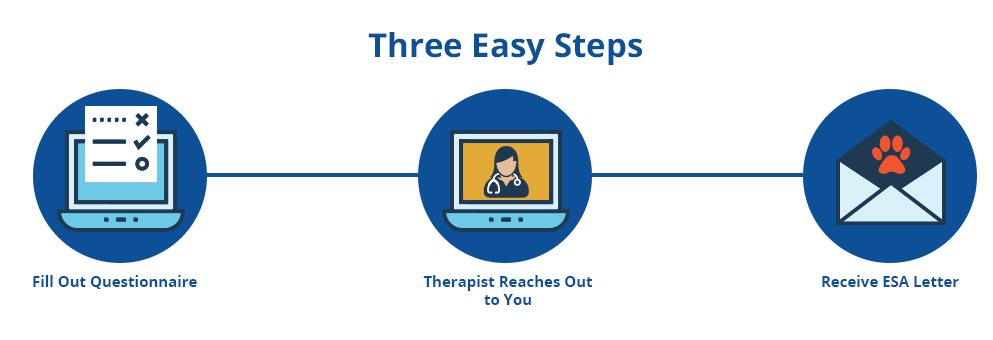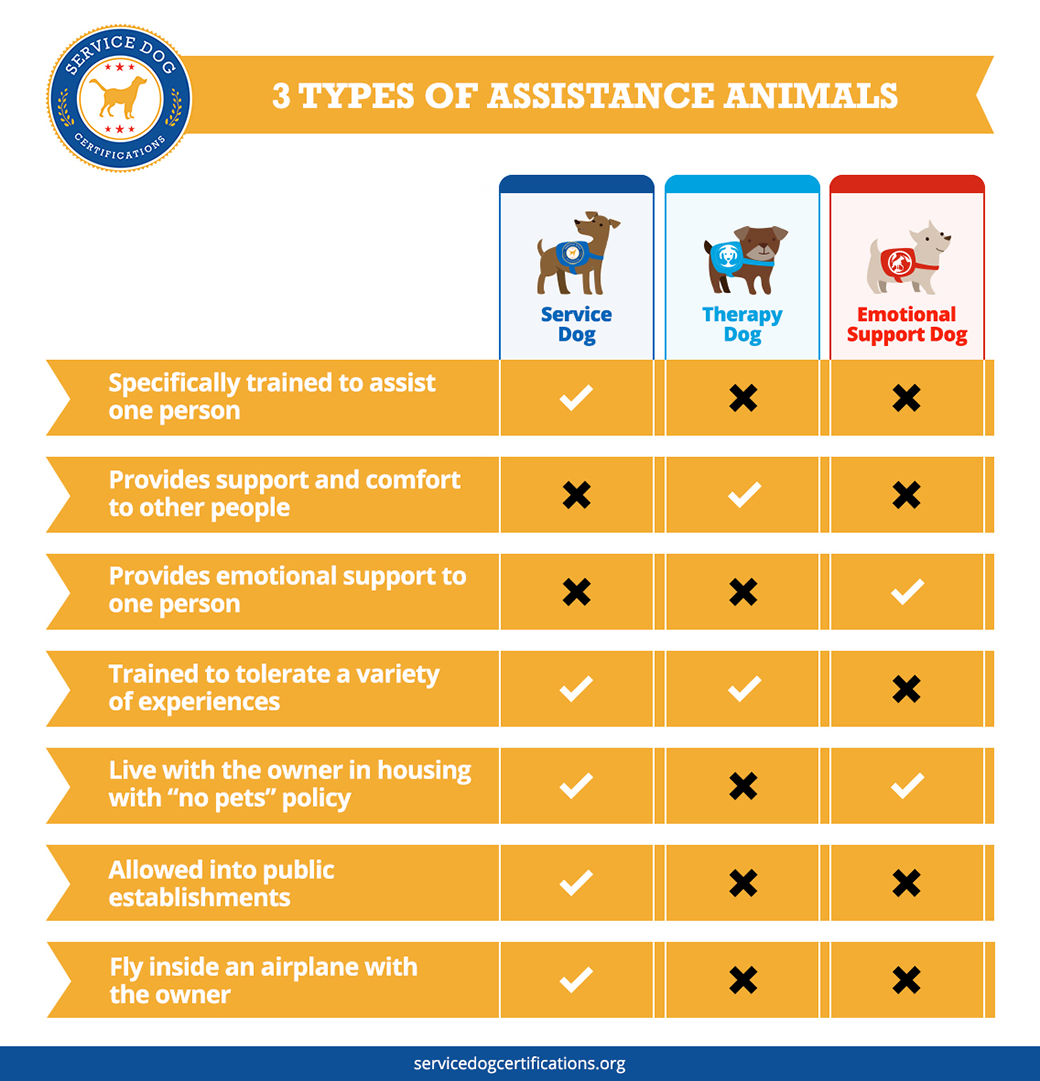Home Page › Blog › The Value of Emotional Support Animals
The Value of Emotional Support Animals

Emotional support animals (ESA) help individuals to overcome mental health challenges. Other people may only see a pet, but an emotional support animal fulfills the valuable role of supporting the handler in mastering life’s challenges that others might take for granted.
Is an Emotional Support Animal for you?
If you have a mental disability — such as depression, anxiety, or other psychological disorder — you may qualify for an emotional support animal. It is well documented that ESAs provide a therapeutic benefit through comfort and companionship. To qualify for an emotional support animal, you need to obtain an ESA letter. Talk to your licensed health care professional or, if your therapist is unavailable or out of state, connect with one through an online service, such as ESA Doctors.
Pets versus Emotional Support Animals
On a general level, pets provide a special beneficial relationship. The Human-Animal Bond Research Institute (HABRI) has collected scientific evidence, which shows how pets positively influence human lives. Pets can encourage social interaction. Pet owners are more likely to get to know their neighbors and have positive relationships than individuals who don’t own a pet. Pets can contribute to a healthy life by improving physical health, decreasing stress levels, and providing companionship.
Emotional support animals, however, have a very specific and essential task.
An Emotional Support Animal is More Than a Pet
More than pets, ESAs are required to serve a vital therapeutic purpose. ESAs allow people with emotional and mental health challenges to accomplish life activities that they would otherwise be unable to do. But, as opposed to a psychiatric service dog, an emotional support animal is not trained to perform a specific task.
Given the importance of the human-animal bond, it’s not hard to imagine how emotional support animals can improve the quality of life for a person suffering from a mental health issue or disability.
Emotional support animals serve a particular therapeutic purpose by helping with emotional and mental health issues.
Mental Health Help
Before the value ofemotional support animals can be explained, the importance of a person’s healthy mental well-being needs to be recognized. Mental health affects a person’s life as a whole. Not addressing these mental health concerns can cause problems at work, school, with friends, or even with family. Ignoring mental health issues can also compromise physical health in the long run by raising blood pressure, increasing heart rate, and causing muscle tension.
Inadequate mental health can leave a person feeling lonely, drained, and defeated, unable to perform daily tasks that others take for granted. For example, a person may experience anxiety, making them unable to travel or be in social situations. Illnesses such as depression or post-traumatic stress disorder (PTSD) can cause insomnia, causing someone to be unable to obtain adequate sleep. Mental concerns can have a sweeping negative impact on a person’s life.
Benefits of an Emotional Support Animal
For people trying to overcome mental health issues, every little triumph can help on the way to recovery.Emotional support animals can offer support on the path to healing.
Numerous studies have documented how ESAs can be part of the wellness plan for mental health issues and other disorders. Emotional support animals have been essential in helping people manage disorders such as:
- Anxiety
- Depression
- Post-traumatic stress disorders (PTSD)
- Agoraphobia (fear of being outside of the home)
- Aerophobia (fear of flying)
- General Anxiety Disorder
- Stress-induced situations
- Social shyness.

Get the Love and Support you deserve!
Anxiety and PTSD
Anxiety can be difficult to overcome without assistance. For those whose anxieties include phobias, anxiety can make everyday tasks impossible to accomplish. Emotional support animals are useful for anxiety and specific phobias. The ESAs provide a sense of comfort and safety, enabling patients to face and overcome those phobias. For instances:
- Individuals who tend to have anxiety attacks when traveling often feel calmer in the presence of an Emotional Support Animal.
- Hospitalized patients with serious medical diagnoses have been shown to experience a decrease in anxiety when able to interact with an ESA.
- In courtrooms, Service Animals and Emotional Support Animals are used to provide victims some security while they are testifying against their alleged assailant.
Many therapists utilize Emotional Support Animals for veterans who have PTSD. A Pairing Assistance-Dogs with Soldiers (PAWS) study demonstrated that dogs significantly reduce symptoms of post-traumatic stress in veterans. Veterans with Service or Emotional Support Dogs reported improved interpersonal relationships with others, fewer instances of depression, and fewer instances of substance abuse than veterans without dogs.
Depression
In the case of depression, emotional support dogs can save a life. In instances of severe depression, a person may be unable to perform daily activities, or they may have feelings of suicide. There is scientific evidence that a human-animal bond can be a protective factor against suicide and depression. An ESA for depression can improve mood, increase sociability, and promote responsiveness to others in cases of depression.
Beyond Priceless
Anemotional support animal — a dog, cat, or any other animal — serves a specific and valuable service for the people they accompany. More than pets, ESAs serve a particular therapeutic purpose by helping deal with emotional and mental health issues. Understanding the therapeutic value of emotional support animals can lead to their increased acceptance into society.

About the Author: The writing team at Service Dog Certifications is made up of folks who really know their stuff when it comes to disability laws and assistance animals. Many of our writers and editors have service dogs themselves and share insights from their own experiences. All of us have a passion for disability rights and animals.
2 comments
Leave a Reply Cancel reply
Latest Posts

Can a Social Worker Write an ESA Letter?
Social workers are qualified to write an emotional support animal (ESA) letter. Here are the reasons why. The Legal Reason Social Workers Can Write ESA Letters Under HUD’s guidelines for emotional support animals, you must get an ESA letter from a licensed healthcare professional. The term “licensed healthcare professional” encompasses a wide variety of mental […]

Read More

Ohio Service Dog Requirements
You can bring a service dog almost anywhere where pets aren’t allowed in Ohio as long as you meet all the necessary requirements. The rights of service dog handlers in the Buckeye State are covered under federal and state laws. This guide will walk you through Ohio’s legal requirements for service dogs. Ohio Health Requirements […]

Read More

How to Bring a Service Dog to Disneyland
Trained service dogs are more than welcome to join their handlers at Disneyland. In this guide, we’ll explain Disneyland’s policies and give practical advice for bringing a service dog to Disneyland for the first time. Disneyland’s Service Dog Policies The Magic Kingdom is happy to welcome trained service dogs across most park locations! They kindly […]

Read More









Can a service animal be beneficial to a person who has gone through a traumatic sudden illness that results in them having mobility issues and being on dialysis 3 days a week?
If the condition is a disability and requires a service dog that performs a task or job relating to that disability, then yes a service dog may be beneficial. If the animal is being used for mental health issues and is not trained to perform a task, it may serve as an emotional support animal.